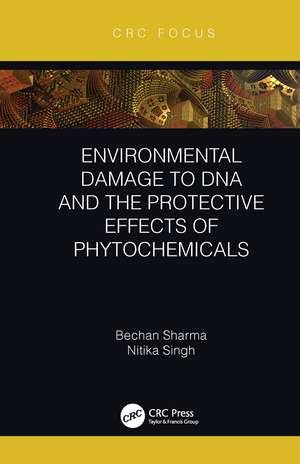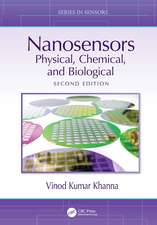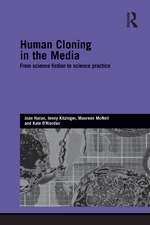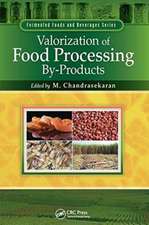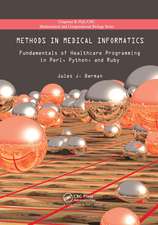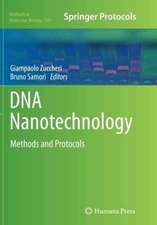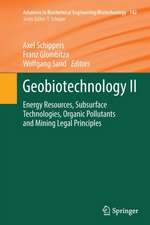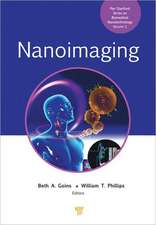Environmental Damage to DNA and the Protective Effects of Phytochemicals
Autor Bechan Sharma, Nitika Singhen Limba Engleză Hardback – 3 aug 2021
The book offers comprehensive coverage of the many essential topics in the subject including:
- Environmental factors and DNA damage
- Molecular mechanisms associated with DNA damage by various environmental (Physical, Chemical and Biological) factors
- Synergistic effects of environmental factors
- Phytochemicals acting both as DNA protectants and genotoxicants
- Experimental models for the study of the genotoxic potential of environmental factors and protection by phytochemicals
Environmental Damage to DNA and the Protective Effects of Phytochemicals is intended to cater the need of BSc, MSc and research students who are striving to discover the mechanism(s) associated with protection of DNA by plant-based chemicals. This is the first edition of our book and the valuable suggestions and comments from the readers are solicited.
Preț: 461.45 lei
Nou
Puncte Express: 692
Preț estimativ în valută:
88.31€ • 92.08$ • 73.39£
88.31€ • 92.08$ • 73.39£
Carte tipărită la comandă
Livrare economică 21 martie-04 aprilie
Preluare comenzi: 021 569.72.76
Specificații
ISBN-13: 9780367358228
ISBN-10: 0367358220
Pagini: 136
Ilustrații: 12
Dimensiuni: 138 x 216 x 13 mm
Greutate: 0.27 kg
Ediția:1
Editura: CRC Press
Colecția CRC Press
ISBN-10: 0367358220
Pagini: 136
Ilustrații: 12
Dimensiuni: 138 x 216 x 13 mm
Greutate: 0.27 kg
Ediția:1
Editura: CRC Press
Colecția CRC Press
Public țintă
Postgraduate and ProfessionalNotă biografică
Dr. Bechan Sharma is presently working as a Professor and Head, Department of Biochemistry Allahabad University, Allahabad. Prof. Sharma’s earlier services include as an Assistant Professor at Sher-e-Kashmir University of Agricultural sciences and Technology-J&K, Kashmir and as Associate Professor at Dr. RML Avadh University Faizabad. He has completed his higher education such as B.Sc (Honours)-1980; M.Sc. (Biochemistry)-1982 and Ph.D. in Biochemistry (1988) from BHU-Varanasi. He qualified GATE in 1983 and CSIR (JRF-NET) in 1984 and then joined Central Drug Research Institute-Lucknow for completing his doctoral research. The areas of his research interest include Molecular Biology of HIV/AIDS, Tropical Diseases (Filariasis/Malaria) and Biochemical Toxicology. He has received number of Awards/ Honors and successfully completed numerous important Academic/ Administrative Assignments. He has twenty six years of teaching / research experience. He has carried out several research projects and published over 130 research papers including book chapters, molecular methods in peer reviewed International and National Journals/ Books/Methods of repute with high impact factors. He has one US patent on HIV-1 genome structure based antiHIV-1 drugs design to his credit. He has supervised 9 PhDs and four Post Doctoral Research Fellows and 4 are continuing research under his supervision. He is member/life member of several national/international scientific societies and attended number of symposia/conferences in India and abroad and presented his research papers there in. He is Chief-Editor/Associate Editor/Executive Editor and Member Editorial Board of 75 peer reviewed International and National Journals. He has been acting as honorary reviewer for about 130 International/National scientific journals. His 4 books have been published by International publishers and 2 are in print. He has worked as a visiting scientist in USA for over three years and visited different labs at Italy, France, Iran, Thailand, Germany and Brazil for three to four months in similar capacity to conduct different collaborative research projects related to HIV-1 molecular biology, molecular epidemiology, bioinformatics and HIV-1 genome structure based antiHIV-1drug design etc. Prof. Sharma has recently beenawarded with ICMR’s Senior Scientist Fellowship 2014-15 in Biomedical Sciences under Indo-USA joint research programme. Prof. B. Sharma is a Fellow of Academy of Environmental Biology and Bioved Research Society.
Ms. Nitika Singh is currently pursuing D. Phil. research programme at the Department of Biochemistry, Faculty of Science, University of Allahabad, India on the research topic concerning xenobiotics mediated biochemical perturbations in mammalian systems and its protection by plant-based principles. She has been a very meritorious student throughout her academic career and received several Merit awards. After graduating from M.G. Kashi Vidyapeeth-Varanasi, she qualified National level examinations of University of Allahabad to pursue her Master Degree Programme in Biochemistry and Doctoral Research Programme in Science during 2014 and 2016, respectively. She has also successfully completed the Diploma Course in French.She is expert in handling several modern techniques applied in Biochemistry, Toxicology and Molecular Biology research (Agarose gel electrophoresis, SDS and Native PAGE, Submarine gel electrophoresis, Centrifugation, DNA isolation, DNA damage and repair assay, and Enzymes assays using Spectrophotometer, Gel Doc Scanning, HPLC, Spectro-fluorometry, and Microscopy). She has published her papers in many peer reviewed international journals of repute. Ms Singh has attended several workshops, conferences and seminars and presented her research papers / posters in many scientific meetings.
Ms. Nitika Singh is currently pursuing D. Phil. research programme at the Department of Biochemistry, Faculty of Science, University of Allahabad, India on the research topic concerning xenobiotics mediated biochemical perturbations in mammalian systems and its protection by plant-based principles. She has been a very meritorious student throughout her academic career and received several Merit awards. After graduating from M.G. Kashi Vidyapeeth-Varanasi, she qualified National level examinations of University of Allahabad to pursue her Master Degree Programme in Biochemistry and Doctoral Research Programme in Science during 2014 and 2016, respectively. She has also successfully completed the Diploma Course in French.She is expert in handling several modern techniques applied in Biochemistry, Toxicology and Molecular Biology research (Agarose gel electrophoresis, SDS and Native PAGE, Submarine gel electrophoresis, Centrifugation, DNA isolation, DNA damage and repair assay, and Enzymes assays using Spectrophotometer, Gel Doc Scanning, HPLC, Spectro-fluorometry, and Microscopy). She has published her papers in many peer reviewed international journals of repute. Ms Singh has attended several workshops, conferences and seminars and presented her research papers / posters in many scientific meetings.
Cuprins
1 Introduction to the environmental factors and DNA damage 1
2 Molecular mechanisms of physical environmental factors as DNA-damage agents with special reference to (A) Radiations and (B) Temperature 13
3 Effects of chemical environmental factors (both natural and anthropogenic) on DNA and their modes of action. A. Organic factors (pesticides, dyes) B. Inorganic Factors (Heavy metals) 25
4 Biological factors causing DNA damage. A. Plant-based molecules. B. Animal-based molecules
5 Synergistic effects of environmental factors on DNA damage. A. Introduction to Synergism B. Synergistic effects C. Mechanism of actions
6 Introduction to phytochemicals and their actions on DNA. A. DNA-damaging action. B. DNA-protective function
7 Phytochemicals as DNA protectants and genotoxicants A. Phytochemicals as genotoxicants. B. Plant extract as DNA protectants. C. Isolated compounds as DNA protectants
8 Role of phytochemicals in protection of DNA from damage by different environmental factors. A. Physical factors (Thermal and radiation). B. Chemical factors (Organic and inorganic). C. Biological factors (Plants and animals)
9 DNA protective and genotoxic potential of environmental factors: Experimental models for the study
10 DNA damage: Overview, conclusion, and future perspective
2 Molecular mechanisms of physical environmental factors as DNA-damage agents with special reference to (A) Radiations and (B) Temperature 13
3 Effects of chemical environmental factors (both natural and anthropogenic) on DNA and their modes of action. A. Organic factors (pesticides, dyes) B. Inorganic Factors (Heavy metals) 25
4 Biological factors causing DNA damage. A. Plant-based molecules. B. Animal-based molecules
5 Synergistic effects of environmental factors on DNA damage. A. Introduction to Synergism B. Synergistic effects C. Mechanism of actions
6 Introduction to phytochemicals and their actions on DNA. A. DNA-damaging action. B. DNA-protective function
7 Phytochemicals as DNA protectants and genotoxicants A. Phytochemicals as genotoxicants. B. Plant extract as DNA protectants. C. Isolated compounds as DNA protectants
8 Role of phytochemicals in protection of DNA from damage by different environmental factors. A. Physical factors (Thermal and radiation). B. Chemical factors (Organic and inorganic). C. Biological factors (Plants and animals)
9 DNA protective and genotoxic potential of environmental factors: Experimental models for the study
10 DNA damage: Overview, conclusion, and future perspective
Descriere
Environmental damage to DNA and the protective effects of phytochemicals provides information on the toxicity of natural as well as synthetic chemicals in the living systems leading to DNA damage and emergence of serious consequences or manifestations causing varied health hazards.
